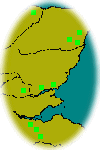


|
|
LE FastCounter
| Genetic modification
(GM) The idea of putting genes from one organism into another is not new, but only recently has it become a practical proposition. It is now possible to re-engineer an organism's DNA to include factors from another, sometimes totally different, organism to produce such effects as resistance to disease, herbicides or to improve their keeping characteristics. Doing so is becoming a major industry, the new science-based manufacture of the twenty-first century. Risk money loves this sort of developing industry and fights to retain its investment. New crops
One of the main directions of development is to produce crops which can be sprayed with weedkiller which will kill the weeds but to which they will be resistant. Problems with genetically modified crops "Can we control what happens to the DNA inserted into genetically modified crops once they are released into the environment? Is the use of antibiotic and herbicide- resistant genes in crops safe or desirable? Are there other, more intangible objections to increasingly 'unnatural' forms of agriculture?" The Nuffield Council on Bioethics asks these pertinent questions. They also consider whether UK regulations are adequate to protect us during the development process, whether we will be able to choose not to eat such foods, and whether developing countries, who may have most to gain, will be able to afford these expensive products. Since the UK traditionally imports a large proportion of its food and soya, for instance, is mixed with so many other constituents, it is not possible to label foods accurately as GM or not. A farmer in a developing country could be totally dependent on a crop company for both his seeds and the compatible chemmical weedkillers. The wild plants which are currently safe from herbicides might be so no longer, if farmers were able to use more powerful chemicals without harming the crop. Growing insect-resistant crops could severely reduce the numbers of insects in our countryside and thus the birds which feed on them. Using antibiotic genes may de-sensitise dangerous organisms so that they can no longer be controlled. Problems with performance The companies developing GM crops are confident that their products are safe. Experience suggests otherwise. The genes which are believed to be un-transmissible are all too readily transferred to other organisms. When French scientists planted wild radish plants next to transgenic oilseed rape they found that the hybrid plants also carried the herbicide-resistant gene. Even in the fourth generation 20 per cent of the hybrids retained the gene for herbicide resistance. Thus farmers who think they are buying into a new efficient weed control regime may find that in fact they are simply creating newly uncontrollable pest species. Snowdrops contain a lectin which interferes with insect digestion and thus protects them from predation. If the gene for this is inserted into potatoes they gain a similar protection. Lab tests found that the potatoes killed off significant numbers of the aphid pests. But if the aphids were then fed to ladybirds, the ladybirds only lived half as long as those fed on aphids from normal potatoes. And up to 30 per cent fewer viable eggs were laid by the unlucky ladybirds feeding on affected aphids. The risk is that we could wipe out the predator which controls aphids and leave ourselved utterly dependent on the GM varieties of potato. In Mississippi the Monsanto company has suffered a major setback. It produces a herbicide called Roundup and launched a cotton variety resistant to Roundup. The new variety could be sprayed directly but last year's crop was badly affected with small, deformed bolls, some of which fell off. Over 12,000 hectares, apparently all Monsanto cotton, was affected. Farmers have lost millions of dollars through their reliance on the new technology. It therefore seems unlikely that there are no risks.
|
Problems with
development
The companies which are carrying out development of the transgenic crops are subject to few checks. Problems which arise may be of lasting importance in the countryside. The Advisory Committee on Releases to the Environment supervises licensing in Britain. Many of its members are members of the companies applying for the licenses and no application has yet been refused, according to Friends of the Earth. The actual growing of the crops can sometimes be messy. The ACRE newsletter lists recent non-compliances. John K King and Sons Ltd: "the consent holder exerted little management control over the release", before the inspection by Health and Safety officials. Then "appropriate measures were subsequently implemented prior to harvest". Nickerson BIOCEM Ltd: "Two days prior to a routine inspection by HSE Inspectors" the company notified them of a breach of conditions. An isolation distance of 400 metres had been reduced to 2.5 metres at sowing. Scottish Crop Research Institute: Health and Safety inspectors found that the growers had "failed to destroy surviving ground-keepers and emerging volunteers". The wrong follow-on crop had been planted. "Visual inspection of these release sites to identify surviving volunteers for spot-treatment with herbicides was also ineffective". Non-compliance with the conditions and limitations of the consent is
an offence liable to prosecution and may also result in revocation of consent.
Whether there have been any prosecutions yet is not known.
 The table, displaying results of a survey commissioned by the pressure group GeneWatch and conducted by MORI, is taken from a New Scientist News section. It shows an increasing distrust of genetic engineering in food. Support for the industry has fallen from 31% to 22%. Activists have taken the law into their own hands, tearing up crops which were being grown to test the new engineering. The case, ultimately unsuccessful, in which Guy Watson tried to prevent cross pollination of his organic produce by GM crops nearby, was widely publicised, reported in the best papers, and ended in judicial criticism of Government administration. At least one major supermarket chain has banned GM food from its shelves. Like nuclear energy, this may well turn out to be one of those cases where the gut feeling of ordinary people is more reliable than the enthusiasm of scientists. Wild Plants and GM The likely effects of genetic modification on our wild plants are currently incalculable. The close genetic links between some of our crops and some of our wild plants means that genetic overflow is surely likely. Sea beet is related to cultivated beets such as sugar-beet, beetroot and mangel wurzel. Wild cabbage is just one kind of brassica of which others are cultivated. English Nature is concerned that GM organisms are developed quickly and without any natural controls. Risks may arise from GM invasion of semi-natural habitats, or from competitive displacement of native species by transgenic plants. The development of crops resistant to insect, bacterial and fungal attack may jeopardise the survival of native species, including beneficial insects, which rely upon such organisms within food webs. EN is recommending a moratorium on commercial releases of genetically modified herbicide tolerant and insect resistant crops until current research has been completed and evaluated. |